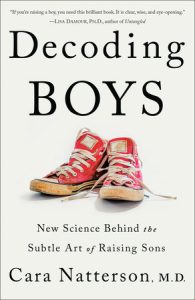The Emotional Impact of Early Puberty
 Puberty is an expected part of development that causes many changes in the body. For kids with central precocious puberty (CPP), however, starting puberty at an unusually young age and often several years before their peers may take a toll on their emotional and mental health. Read more ›
Puberty is an expected part of development that causes many changes in the body. For kids with central precocious puberty (CPP), however, starting puberty at an unusually young age and often several years before their peers may take a toll on their emotional and mental health. Read more ›


 From surging hormones and acne to body hair and body odor, puberty can be a rocky transition for any kid. But girls and boys who start physically developing sooner than their peers face particular social and emotional challenges, researchers find.
From surging hormones and acne to body hair and body odor, puberty can be a rocky transition for any kid. But girls and boys who start physically developing sooner than their peers face particular social and emotional challenges, researchers find. 
 Adolescence is a time of emerging independence, growth, and vulnerability. Adolescents are also faced with an array of risk factors that can impede their progress and shape their journey.
Adolescence is a time of emerging independence, growth, and vulnerability. Adolescents are also faced with an array of risk factors that can impede their progress and shape their journey.
 Adolescence is a time of enormous transition. Although adolescence may appear to be a turbulent time, it is also a period of great potential as young people engage more deeply with the world around them. Adolescents typically grow physically, try new activities, begin to think more critically, and develop more varied and complex relationships.
Adolescence is a time of enormous transition. Although adolescence may appear to be a turbulent time, it is also a period of great potential as young people engage more deeply with the world around them. Adolescents typically grow physically, try new activities, begin to think more critically, and develop more varied and complex relationships. 
 For the parents of a teenager, adolescence can be a challenging time. But to a brain scientist, it’s a marvel.
For the parents of a teenager, adolescence can be a challenging time. But to a brain scientist, it’s a marvel.
 When my son was two years old, he slipped and hit his lip on the bathtub. I initially thought he was fine, as he didn’t cry very much, and there wasn’t a lot of blood. However, in the next few days, as his lip started swelling up and he developed two black eyes, I realized he was hurt much more seriously than I initially thought. As it turned out, this high pain tolerance, combined with his hyperactivity, were some of the early signs that my son is hyposensitive.
When my son was two years old, he slipped and hit his lip on the bathtub. I initially thought he was fine, as he didn’t cry very much, and there wasn’t a lot of blood. However, in the next few days, as his lip started swelling up and he developed two black eyes, I realized he was hurt much more seriously than I initially thought. As it turned out, this high pain tolerance, combined with his hyperactivity, were some of the early signs that my son is hyposensitive. 
 Developmental milestones (how a child plays, learns, speaks, acts, or moves)are things most children can do by a certain age. All young children need both developmental monitoring and developmental screening to help you and your child’s doctor, teachers, and other providers know if your child’s development is on track.
Developmental milestones (how a child plays, learns, speaks, acts, or moves)are things most children can do by a certain age. All young children need both developmental monitoring and developmental screening to help you and your child’s doctor, teachers, and other providers know if your child’s development is on track. 
 Executive function skills help people stay focused, and manage the flow of information. Day to day, these skills allow a person to pay attention, plan ahead, remember details, and juggle multiple tasks. They also help control their behavior and emotions, delay immediate rewards for future benefits, and continue forward when faced with challenges.
Executive function skills help people stay focused, and manage the flow of information. Day to day, these skills allow a person to pay attention, plan ahead, remember details, and juggle multiple tasks. They also help control their behavior and emotions, delay immediate rewards for future benefits, and continue forward when faced with challenges. 
 As pediatrician and mother of two teenagers Cara Natterson explains, puberty starts in boys long before any visible signs appear, and that causes confusion about their changing temperaments for boys and parents alike. Often, they also grow quieter as they grow taller, which leads to less parent-child communication.
As pediatrician and mother of two teenagers Cara Natterson explains, puberty starts in boys long before any visible signs appear, and that causes confusion about their changing temperaments for boys and parents alike. Often, they also grow quieter as they grow taller, which leads to less parent-child communication. 

